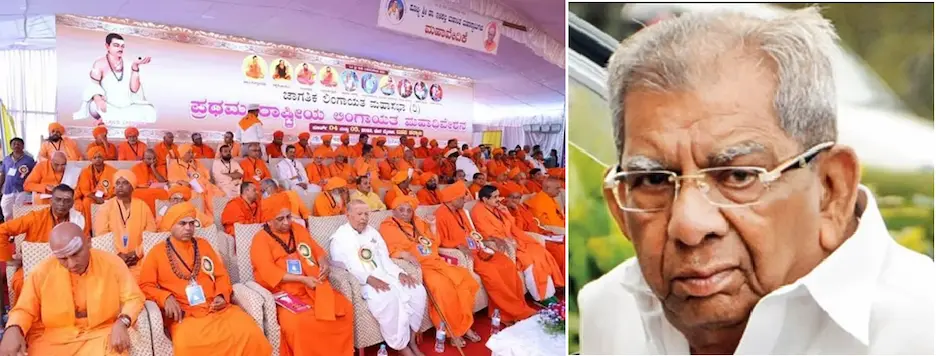
Lingayatism -A powerful movement of equality and devotion that challenges caste and ritual across India
What Is Lingayat? A Faith Rooted in Equality
Lingayatism: The Faith That Broke Barriers – Lingayat is a spiritual movement that began in the 12th century in Karnataka, India. It was founded by Guru Basaveshwara, a visionary philosopher, poet, and social reformer who challenged the rigid caste system and religious orthodoxy of his time.
At its heart, Lingayatism is a monotheistic faith that worships Shiva in the form of Ishtalinga, a personal symbol worn around the neck, representing a direct and intimate connection with the divine. Unlike mainstream Hinduism, Lingayats reject the authority of the Vedas, ritualistic practices, and the concept of rebirth. Instead, they emphasize personal experience, equality, and service to others.
The movement was revolutionary. It welcomed people from all castes and genders, promoted education, and gave rise to Anubhava Mantapa, a spiritual parliament where thinkers – men and women alike shared ideas and poetry known as Vachanas. These writings form the philosophical backbone of Lingayatism and reflect its core values: morality, fraternity, and knowledge.
Lingayatism – Who Follows Lingayat and Who Can Join?
Lingayatism is followed by millions, especially in Karnataka, where it has deep cultural and political roots. It also has significant populations in Maharashtra, Telangana, and parts of Andhra Pradesh and Tamil Nadu.
Followers are known as Lingayats, and they come from diverse backgrounds. Historically, many were from marginalized communities who found dignity and spiritual freedom in Basava’s teachings. Today, Lingayats include farmers, scholars, politicians, and professionals united not by birth, but by belief.
Importantly, anyone can become a Lingayat. The process involves receiving the Ishtalinga through a ritual called Ishtalinga Deeksha, often performed by a spiritual guide. Even during pregnancy, mothers may wear the Ishtalinga for their unborn child, symbolizing early spiritual connection.
Lingayatism doesn’t require conversion in the traditional sense. It’s a way of life, guided by five principles called Panchacharas:
- Lingachara: Daily worship of the Ishtalinga
- Sadachara: Ethical living and fulfilling one’s duties
- Sivachara: Recognizing Shiva as the one true God
- Bhrityachara: Humility and compassion toward all beings
- Ganachara: Loyalty to the community and its values
These principles make Lingayatism accessible to anyone seeking a spiritual path based on equality, simplicity, and inner devotion.
Where Is Lingayat Practiced Today?
While Karnataka remains the heartland of Lingayatism with over 15 million followers, it has spread to other Indian states over centuries. Here’s a quick look at its geographic presence:
| State | Estimated Followers |
| Karnataka | ~15.8 million |
| Maharashtra | ~6.7 million |
| Telangana | ~1.5 million |
| Andhra Pradesh | Growing presence |
| Tamil Nadu | Small but active groups |
Lingayat communities have also migrated globally, especially to Europe, North America, and Australia, where they continue to practice their faith and celebrate festivals like Basava Jayanti and Shivaratri.
In urban centres, Lingayat temples and cultural organizations promote education, social service, and spiritual discourse, keeping the tradition alive across generations.
The Identity Debate: Hindu or ‘Others’?
The recent statement by the Akhil Bharatiya Veerashaiva Mahasabha, urging Lingayats to register as ‘others’ and not Hindus in official documents, has reignited a long-standing debate about the community’s religious identity.
Historically, Lingayats have been classified under Hinduism, often as a Shaivite sect. But many scholars and community leaders argue that Lingayatism is a distinct religion, with its own scriptures, rituals, and philosophy that rejects core Hindu tenets like caste hierarchy, Vedic authority, and idol worship.
This debate isn’t just theological, it has legal and political implications. Recognition as a separate religion could affect:
- Minority rights and benefits
- Educational and religious institutions
- Census classification and representation
In 2018, the Karnataka government recommended Lingayatism be recognized as a separate religion, but the central government did not accept the proposal. The Mahasabha’s recent call reflects ongoing efforts to assert this distinct identity.
For many Lingayats, the issue is not about rejecting Hinduism, but about affirming their unique spiritual path one that champions social justice, personal devotion, and equality.
Final Thoughts: A Faith That Still Inspires
Lingayatism is more than a religion, it’s a movement of the mind and heart. Born out of resistance to inequality, it continues to inspire people to live with dignity, purpose, and compassion.
Whether or not it’s officially recognized as separate from Hinduism, its values remain timeless. In a world still grappling with division and dogma, Lingayatism offers a simple yet profound message: God lives within you, not above you. And everyone is equal in that light.
Stay informed with the latest news and updates – only on Rapido Updates.